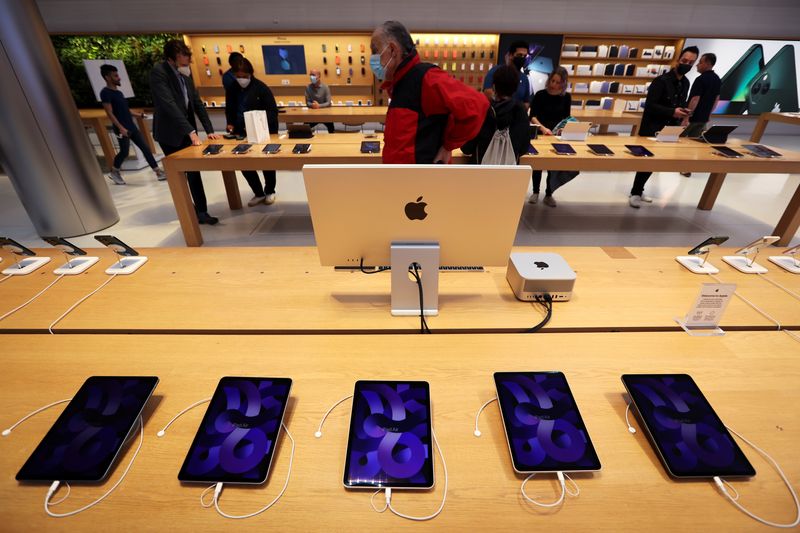Investing.com -- Apple has announced a partnership with OpenAI that will see the iPhone-maker fold ChatGPT into its products.
The OpenAI agreement, which was revealed at Apple (NASDAQ:AAPL)'s annual developers conference on Monday, comes as the tech giant looks to enhance its artificial intelligence capabilities following an intensifying surge in enthusiasm around the nascent technology.
Apple stock rose 6.2% on Wednesday, hitting a new record high.
Prior to the event investors were speculating if Apple would roll out new generative AI features, particularly as it looks to address a growing feeling that it was lagging behind its Big Tech rivals like e-commerce group Amazon (NASDAQ:AMZN) and Google-owner Alphabet (NASDAQ:GOOGL). Chief Executive Tim Cook lauded the new "Apple Intelligence" system, which aims to use AI to improve its Siri voice assistant and deliver more personalized offerings, as the company's "next big step."
The partnership with Microsoft-backed OpenAI will grant Apple users the ability to use Siri to ask ChatGPT questions, although the voice service will ask for permission before connecting with the chatbot.
Because Apple Intelligence will run on more advanced chips, analysts at Oppenheimer are predicting that consumers who do not have the most recent iPhone 15 Pro model of the device will need to upgrade in order to access the AI features. As a result, they argued that AI may fuel a massive upgrade cycle of the iPhone.
"We believe the comprehensive and deep integration will accelerate iPhone replacement in the U.S. and EU in fall 2024," the Oppenheimer analysts said.
Apart from AI, Apple also introduced a more customizable version of its Control Center, which gives users quick access to commonly-used controls and apps, on its latest iOS 18 operating platform. It also said it will deliver a new app designed to make it easier to track and store passwords. Other updates included the inclusion of RCS messaging -- the standard utilized by Android devices -- on iOS 18, as well as iPhone mirroring on Apple's Mac laptops.
The improvements, coupled with the arrival of AI, were seen as a push by Apple to reinvigorate faltering iPhone sales. However, they received a mostly indifferent review from many market observers on Wall Street.
"We will all get new iPhones at some point in the future, but we believe consumers will hold onto their devices longer to save money given the lack of compelling features," analysts at KeyBanc said in a note to clients.
Analysts at Third Bridge also flagged questions around how Apple plans to monetize Apple Intelligence despite possible "interest" from consumers.
Meanwhile, analysts at Bernstein warned that the Apple's OpenAI partnership could be "revenue dilutive initially." The financial details of the agreement remained unclear, but the Bernstein analysts said it could involve revenue sharing, which, given "some possible migration from traditional search queries," could eat away at Apple's top-line returns.
"The lack of a game changing AI product intro/software suite is likely a negative for [near-term] iPhone demand as well as investor sentiment," analysts at UBS said.
Senad Karaahmetovic contributed to this report.
